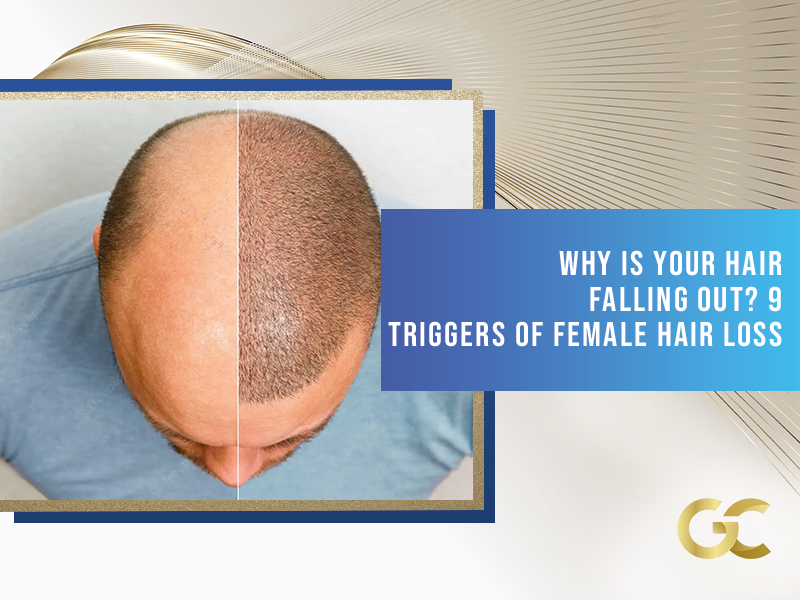Losing from 50 to 150 hairs at any given day is normal. The hair is constantly renewing itself throughout life. Now, if you happen to find extra large clumps of hair in your pillow or comb regularly, it might be something else.
The reason why your hair is falling out can be a number of different things. There are nine main triggers of female hair loss, and knowing them is key to identify which is the one affecting you.
9 Triggers of Female Hair Loss
The following are the nine triggers of female hair loss most commonly seen. The cause of your hair loss is likely one of these.
-
Androgenetic Alopecia
This is a hereditary condition, passed by one or both parents. If there are balding members among your immediate family, it might affect you too. When the genes that cause it are active, your hair follicles will experience shrinking over time until they cease growing, thus causing what we know as baldness.
-
Lupus
It is an autoimmune disorder that can cause alopecia areata. It happens when your immune system starts attacking healthy tissues in your body, which includes hair follicles. The hair will fall in small, coin-sized circular patterns that might develop close by, making a bigger spot. Controlling the condition results in the hair growing back in most cases.
-
Anaemia
Iron deficiency disrupts the production of new hairs. Consume foods rich in iron such as spinach, organ meats, and shellfish to restore their levels. Additionally, iron supplements are also an option.
-
Infections
Fungal infections in the scalp cause the hair follicles to swell and the hair to fall. Also, poor hygiene of the scalp can also lead to an infection, so wash it properly.
-
Traction Alopecia
It happens to people that sport hairstyles that pull the hair for long periods. Actually, pulling action puts the hair follicle under stress, eventually damaging it. Hair loss this way is permanent.
-
Hypothyroidism
It is a condition that leads to your body not producing enough levels of one or many hormones. Among a large number of symptoms this causes, the lack of enough follicular stimulating hormones (FSH) causes hair loss.
Either a tumour or a congenital defect is responsible for this. Treatments include surgery, radiation therapy, or hormone replacement therapy depending on the causes.
-
Chemotherapy
The chemicals in the medication for treating cancer cause hair to fall. The hair will start growing back after six to nine months from the completion of the treatment.
-
Physical and Psychological Stress
Continuous and excessive psychological stress disrupts your body’s hair renewal cycle. And so does physical stress deriving from trauma. One example is an invasive surgery. The hair will likely grow back after some time.
-
Hormonal Imbalance
The reduction of estrogen production and increasing of androgen hormones in the female body often leads to hair loss. Childbirth, menopause and polycystic ovarian syndrome cause this. In some cases, the hair can grow back by controlling the condition causing it.
Treating Female Hair Loss with Hair Transplant
A follicular unit excision (FUE) hair transplant can permanently correct the effect of female hair loss.
By extracting healthy hair follicles from the back of the scalp, our surgeon can graft them into the balding area via microincisions. And once there, they will grow. They will be following your hair’s natural pattern.
Our surgeons deliver hair transplants that blend seamlessly for an affordable price. Contact us if you’d like to have a permanent solution to your female hair loss problems.

